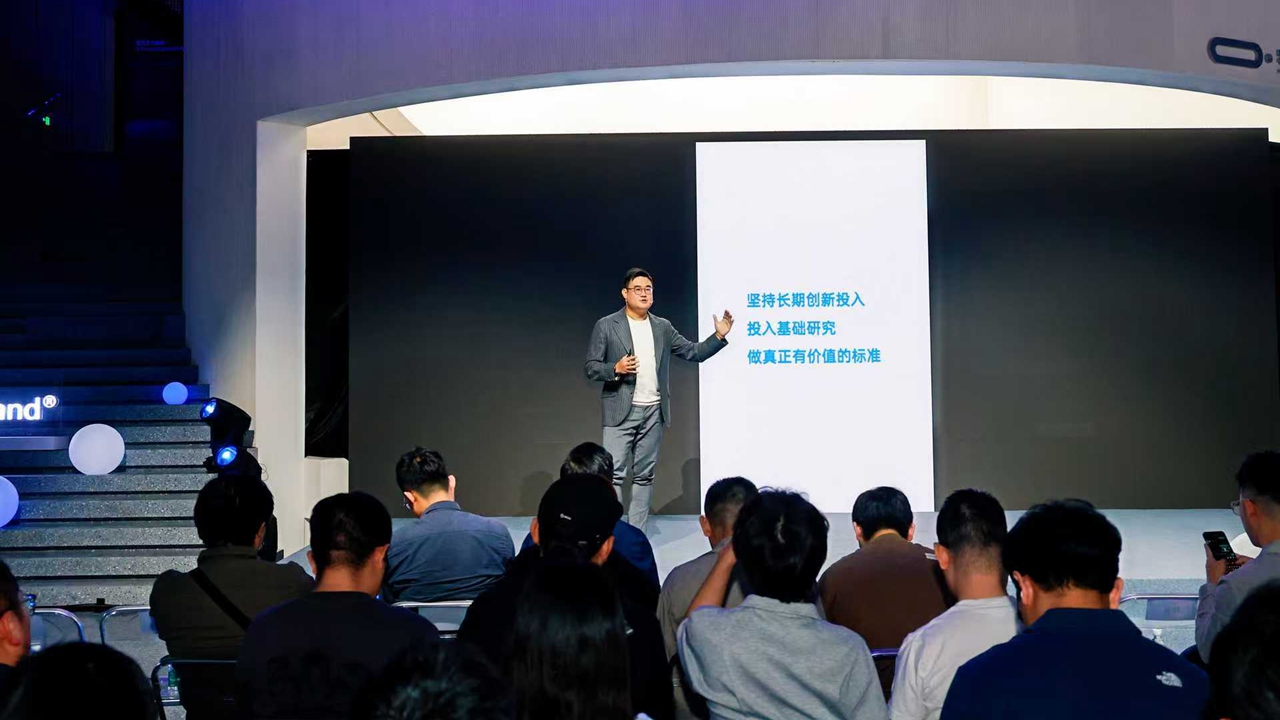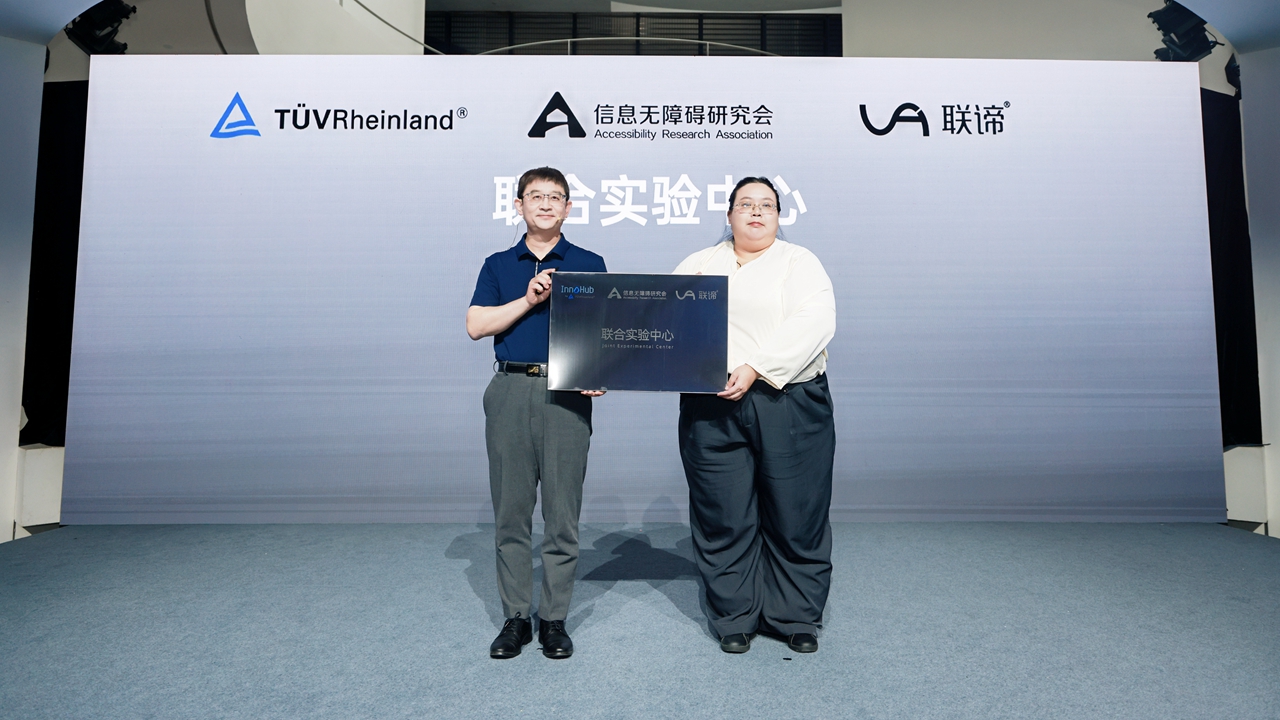TÜV Rheinland unveils new services in Shenzhen
Writer: Yang Yunfei | Editor: Zhang Chanwen | From: Original | Updated: 2025-11-07
TÜV Rheinland, a Germany-based third-party testing, inspection and certification service provider, held its annual new services launch event for 2025 in Shenzhen on Nov. 6, further expanding its innovative testing and certification services in the Greater China region to cover a wider range of sectors with a focus on low-carbon and healthy living.
TÜV Rheinland introduced innovative services across four major areas: robotics, artificial intelligence, acoustics, and display & human factors, opening a new chapter in industry empowerment and offering companies more comprehensive and efficient technical solutions.
“Technological innovation ultimately serves humanity. With ‘technology empowerment + humanistic care’ at its core, TÜV Rheinland is deeply committed to the four areas of robotics, artificial intelligence, acoustics, and display & human factors,” said Jay Yang, senior vice president of TÜV Rheinland Greater China Business Stream Products.
“We not only apply professional testing methods to solve technical challenges and support compliant industry development, but also focus on real‑world scenarios and user needs, building bridges of trust through warm, user‑centered innovative services.”

Jay Yang, senior Vice President of TÜV Rheinland Greater China Business Stream Products, delivers a speech at the company's annual new services launch event for 2025. Photos courtesy of TÜV Rheinland
Yang said TÜV Rheinland will continue to provide high‑standard services to help empower companies “so that technology combines robust capabilities with human warmth, jointly promoting high‑quality industry development.”
During the event, TÜV Rheinland and Shenzhen-based Accessibility Research Association, China’s first NGO dedicated to making information accessible to everyone, jointly announced the establishment of the “InnoHub and Accessibility Joint Laboratory,” which will be dedicated to research on information accessibility technical standards and scenario-based testing, helping optimize the application of smart products in fields such as elderly care and disability assistance.

Stanley Liu (L), General Manager of TÜV Rheinland Greater China Electrical and Yang Hua, Secretary-General of the Accessibility Research Association, unveil Joint Experimental Center of the company.
Founded in Cologne in 1872, Germany-headquartered TÜV Rheinland expanded into China in the 1980s and has set up offices in more than 20 cities including Beijing, Shanghai, Guangzhou and Shenzhen.
The firm’s annual new services launch event for the Greater China region started in Shenzhen in 2016. Over the past years of adhering to the development of new services, TÜV Rheinland has always been focusing on promoting high-quality industry development and providing consumers with higher quality experiences, Yang once said.
This year marks the 30th anniversary of TÜV Rheinland’s Shenzhen office. The company said it will continue to deepen its service exploration, improve its testing standards system, and increase investment in the integration of cutting-edge technology and human needs, providing support for industry innovation and development.
Below is a closer look at each area of the new services TÜV Rheinland introduced at a new services launch event in Shenzhen on Nov. 6.
Robotics: driven by one‑stop certification and intelligent sensor testing
In the robotics field, TÜV Rheinland analyzed the key challenges for consumer robots in materials, wireless, electromagnetic compatibility, safety regulations, functional safety and cybersecurity, clarified regulatory requirements, and offered end‑to‑end one‑stop product certification services. During the event, TÜV Rheinland also introduced its intelligent sensor testing service. By reproducing extreme weather conditions and building realistic road scenarios, it establishes a quantitative perception performance evaluation system and can provide test solutions for sensors such as LiDAR under complex conditions like rain, snow, fog and strong light interference. This service will support advanced driver-assistance systems (ADAS), drones and various intelligent robots with sensor selection advice, multi‑sensor fusion testing and safety certification, making device perception more reliable and better suited to real user needs.
Artificial intelligence: building trustworthy AI through certification
Starting from a “safe and trustworthy” philosophy, TÜV Rheinland offers AI compliance certification based on the latest global legislative frameworks, such as the European Union Artificial Intelligence Act. This provides companies with efficient compliance solutions to help AI products enter global markets quickly. TÜV Rheinland’s AI testing and certification also adopts a “useful and reliable” service mindset to give consumers clear product quality guidance and help them identify and choose high‑quality AI products quickly. TÜV Rheinland will continue to develop industry standards and convey technical trust through deep integration of technology and human-centric principles. By working with partners across the value chain, the firm aims to create genuinely valuable AI products and promote AI development toward being “safe & trustworthy — useful & reliable — valuable & beneficial,” so that AI truly serves and benefits people.
Acoustics: focusing on multi‑dimensional technologies and scenario integration
In the acoustics area, TÜV Rheinland outlined services covering acoustic laboratories, the multi-phase "voice gathering” service technology development route, multimodal perception and scenario integration, and core test facilities such as anechoic chambers. These capabilities emphasize deep integration of acoustic R&D with real application scenarios. Based on basic acoustic parameter measurement, the service focuses on multimodal physical detection of sound, studies auditory human factors, and the adaptation between living environments and eco‑acoustics, aiming to achieve an acoustic balance among people, technology and the environment.
Display & human factors: releasing three major service systems
TÜV Rheinland systematically announced its strategic plan for the visual services field and released the 2025 roadmap for display services. Key highlights include the upgrade and promotion of perceptual stereoscopic color gamut standards and the latest progress on natural‑like lighting service systems, a future-oriented smart cockpit service system and a human-centered Human Factors service system. The new services launch event also introduced an AI‑enabled intelligent eye‑care service system. By using personalized, scenario‑based data analysis, it builds an advanced solution to intelligently monitor, alert and comprehensively assess users’ fatigue and health status, protecting visual health with technology and making display technology more user-friendly and considerate.